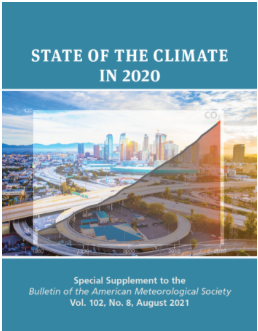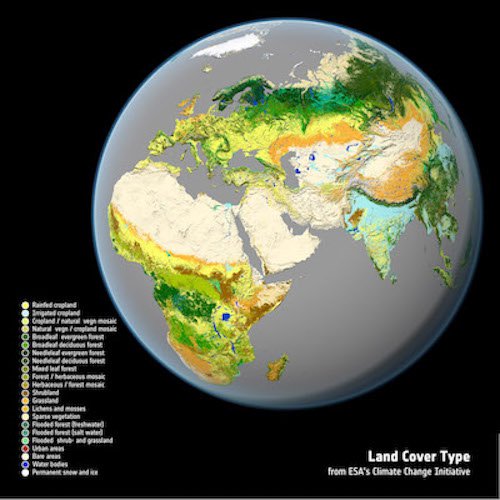10 de septiembre de 2021
Global climate monitoring boosted by satellites - GCOS report
New status report 2021 provides an update on advances in the global climate observing system
‘Satellite observations provide an invaluable part of the climate observing system’
This is a key conclusion in a new report by the scientific body charged with assessing the status, and improvement, of global climate observations.

The report, published by the Global Climate Observing System which supports the United Nations Framework Convention on Climate Change (UNFCCC), describes progress made in observing the Earth's climate in recent years. The review describes several advances in space-based measurements, including major contributions from ESA’s Climate Change Initiative (CCI), which focusses on the development of long-term data records derived from satellites for key aspects of the climate known as Essential Climate Variables.
These ECV datasets are defined by GCOS and are used to solve climate research challenges and inform climate action relating to mitigation and adaptation.
The report’s authors welcome progress made in relation to the spatial and temporal coverage for several satellite observed variables, with the CCI annual land cover change datasets, singled out for praise due to its near-global coverage and good resolution.

Progress has also been made elsewhere, including the cryosphere. While long-term field-based observations of glacier are limited to a few hundred glaciers worldwide, satellite observation records, including those from the CCI’s glaciers project, have enabled this information to be extended globally and have been used to quantify an accelerated retreat since the 1990s.
Satellite-based data products of sea-ice concentration and thickness were noted as having benefited from the ESA CCI research, which have been used recently to validate model simulations which indicate the Arctic Sea will be practically ice free by the middle of this century.
Terrestrial and hydrological progress
Of the terrestrial and hydrological ECVs the report welcomes several new or improved products – all with a significant input from the CCI including.
For the soil moisture ECV, the CCI multi-sensor research product (1978-2020) is now systematically extended and improved on a yearly basis. This variable is fundamental for our understanding of long-term dynamics in the coupled water, energy and carbon cycle over land.
The CCI fire project is making significant advances to address the requirements of the Fire disturbance ECV, and in turn, support carbon model development. The project provides global burned area time series spanning 30 years starting in 1982 and has improved small burn patch detection.
Newer variables - big advances
CCI satellite products are helping to address some of the newer GCOS-defined ECVs, with the recent release of the most complete satellite record for a basket of lake variable, welcomed by GCOS.
Observations of lake water extent and lake ice extent are made only by satellite and their availability will significantly enhance the ability to study lake dynamics. Data for lake water level and lake surface water temperature while less accurate than in situ measurements, provides a worldwide view that is not available from monitoring on the ground, again supporting current and future research.
Observations of forest biomass have also advanced. The CCI’s biomass project have released one hectare resolution global products for 2010, 2017 and 2018. With validation activity underway, this work is bringing the prospect of biomass change monitoring closer, with benefits for forest conservation and emissions mitigation to support the Paris agreement.
The report entitled ‘The Global Climate Observing System 2021: The GCOS Status Report (GCOS-240)’ cites contributions from ESA missions and other CCI state-of-the-art satellite-derived datasets, including sea level
All CCI data products are freely available to users via the CCI Open Data Portal and have fully characterised uncertainties and are validated using independent, traceable, in-situ measurement.

